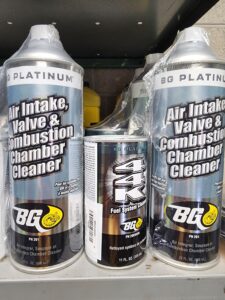If your car is running rough, idling strangely, or you’ve noticed a drop in gas mileage, you might have heard about air intake valve or fuel system cleaners. But do these treatments actually work?
At Joe’s Slinger Service we’ve seen firsthand how buildup from carbon and fuel deposits can affect engine performance—especially in today’s direct-injection engines. Over time, deposits can form on the intake valves, inside fuel injectors, and throughout the fuel delivery system, causing hesitation, poor fuel economy, or even hard starting.
Here’s what these cleaners actually do:
-
Air intake valve cleaners help remove carbon deposits from the valves and upper intake system, which is especially helpful on GDI (gasoline direct injection) engines that are known for carbon buildup.
-
Fuel system cleaners are added to your gas tank and work their way through the system to clean injectors, fuel rails, and combustion chambers.
When They’re Worth It:
-
When used as part of routine maintenance—every 30,000 to 60,000 miles—these services can prevent major problems and keep your engine running efficiently.
-
They’re most effective when applied by a professional, using equipment designed to clean deeply and safely.
-
These treatments are often recommended if you’ve experienced rough idle, loss of power, or reduced MPG.
But it’s important to know that not all products work the same. Many over-the-counter cleaners are mild and may not fully break down stubborn deposits. That’s why we use professional-grade cleaners that are matched to your engine’s needs.
If you’re near Washington County or surrounding areas, and you’re wondering whether your car would benefit from a fuel system cleaning or intake decarbon service, stop by Joe’s Slinger Service. We’ll inspect your vehicle and help you decide if a cleaner is the right next step—or if a more involved repair is needed.

